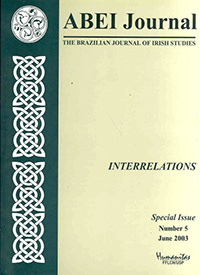The Ontological Imperative in Irish Writing
DOI:
https://doi.org/10.37389/abei.v5i1.182591Resumen
There is a tendency to engage with Irish writing and culture in terms of identity. Epistemological concerns are therefore foregrounded with the emphasis on the intellect and the imagination and how it creates and apprehends itself in relation to the world about it. Identity, then, in either the political or historical sphere becomes a matter of narrative. This, it could be argued, fits neatly with Ireland’s conception of itself primarily as a culture where the act of story-telling is celebrated above all else. I want to argue that in the last thirty years there has been a recognition of ontological concerns in Irish writing; in other words, a shift in emphasis away from epistemology toward a questioning of Being – of what it is to exist. Of course, Being can only be imperfectly accessed through language so that words and narrative still remain of paramount importance. Yet, this shift signals a self-reflexive consideration of the ontological status of the text itself. Thus the act of writing is interrogated and its relationship to the ‘real’ world probed. Form now becomes important as writers struggle to find and sustain a structure/model in either poetry, prose or drama that will adequately express their predicament. John Banville’s novels are the most obvious example of books about the writing of books. Yet, in looking at the work of some other contemporary Irish writers like Brian Friel, Seamus Deane, Tom Murphy and Eilís Ní Dhuibhne it can be observed that each of them struggle with the telling of their stories, with attempting to give final shape and meaning to their narratives.
Referencias
Banville, John. Birchwood. London: Panther Books, 1978.
____. The Newton Letter: An Interlude. London: Secker and Warburg, 1982.
Burgstreller, Suzanne. “This Lawless House: John Banville’s Postmodernist Treatment of the Big
House Motif in Birchwood and The Newton Letter”, in Otto Rauchbauer (Ed.). Ancestral Voices:
The Big House in Anglo-Irish Literature: A Collection of Interpretations. Dublin: The Lilliput
Press, 1992.
Deane, Seamus. Reading in the Dark. London: Jonathan Cape, 1996.
Devitt, John. “Murphy and Molly”, in The Irish Catehist, v. 7, n. 4, 1983.
Friel, Brian. Selected Plays. With an introduction by Seamus Deane. London: Faber and Faber, 1984.
____. Dancing at Lughnasa. London: Faber and Faber, 1990.
Hand, Derek. “Being Ordinary: Ireland from Elsewhere: A reading of Éilís Ní Dhuibhne’s The Bray
House”, in Irish University Review. (Spring/Summer) v. 30, n. 1, 2000.
Harris, Claudia. “Prize-winning Play by Murphy”, in Irish Literary Supplement, (Spring) v. 4, n. 1,
Joyce, James Occasional, Critical, and Political Writings, Edited with an Introduction and Notes by
Kevin Barry, Oxford University Press: Oxford, 2000.
Kearney, Richard. Transitions: Narratives in Modern Irish Culture. Dublin: The Wolfhound Press,
McGahern, John. Amongst Women. London: Faber and Faber, 1991.
McHale, Brian. Postmodern Fiction. London: Routledge, 1987.
Ní Dhuibhne, Éilís Blood and Water. Dublin: Attic Press, 1988.
____. The Dancers Dancing. Belfast: The Blackstaff Press, 1999.
O’Toole, Fintan. Tom Murphy: The Politics of Magic. Dublin: New Island Books, 1994.
Roche, Anthony. Contemporary Irish Drama: from Beckett to McGuinness. Dublin: Gill & Macmillan,
RTE. Portrait of the Irish Artist. Directed by Sean O Mordha, 2001.
Said, Edward. Orientalism. Penguin Books: London, 1978.
Descargas
Publicado
Número
Sección
Licencia
Derechos de autor 2003 Derek Hand

Esta obra está bajo una licencia internacional Creative Commons Atribución-NoComercial 4.0.


